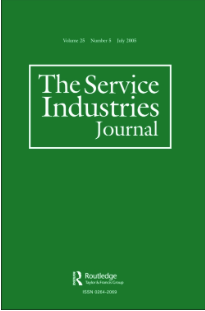 Special Issue of the Service Industries Journal
Special Issue of the Service Industries Journal
Service Industries and Informal Economy
Deadline: May 1st, 2017
This special issue on ‘Service Industries and the Informal Economy’ addresses the growing role played by the informal economy in the provision of services. With some 60% of workers globally having their main employment in the informal economy, it is perhaps surprising that little attention has been paid to this issue by service industry researchers. Whether considering the developing, transition or advanced economies, it takes little more than a moment’s reflection to understand the extent to which service provision occurs in the informal economy. The aim of this special issue is to begin to fill the gap in evidence-based research on this issue by publishing papers that address the extent to which, and how, the informal economy plays a role in the provision of services, the characteristics of such informal sector provision, the motives of suppliers and customers, and what might be done to address this issue. To do this, papers are called for evaluating both the unpaid and paid informal economy.
Across the advanced, transition and developing economies, there is recognition that the unpaid informal economy plays a prominent role in the household services sector, not only in the provision of routine domestic services (e.g., household cleaning, caring) but also the delivery of home repair and maintenance, such as do-it-yourself activity. There is also recognition that there is a growing trend to outsource such service provision (Carbonnier and Morel, 2015). Understanding the barriers to outsourcing household services to the formal economy requires far greater attention than has so far been the case. So too do the gender implications of outsourcing domestic services require attention (Windebank, 2000).
There is also a need for greater attention to be given to paid informal work, or what is known as either the shadow economy or undeclared work, in the service sector. Little is known about the size of the informal economy either across the service sector as a whole, or in particular service industries, either globally, in particular global regions, or nations. Neither is much known about the characteristics of the informal economy in particular service industries. There is nevertheless recognition that the informal economy might play a major role in the hospitality industry, retailing and transport services, and perhaps a growing role, especially with the advent of the sharing economy which provides an opportunity for informal sector providers to replace formal sector service provision. There is thus a pressing need to understand this issue.
We welcome submissions that can represent different methods (both qualitative & quantitative) and evidence based on data from any part of the globe. These include but are not limited to new frameworks using multidisciplinary and interdisciplinary explanations. Some possible (but not exclusive topics) include:
- Extensiveness of the informal economy in the provision of services
- Characteristics of the informal economy in specific service industries
- Drivers of the use of the informal economy in particular service industries
- Country-level case studies of the role played by the informal economy in the provision of services
- Case studies of the role played by the informal economy in specific service industries
- Barriers to outsourcing household services to the formal economy
- The political economy of domestic services (e.g. with ethnic, gender and other dimensions of labour market marginalisation, poverty and social exclusion)
- Poverty and welfare of domestic service providers (using cross-sectional and longitudinal large household surveys from emerging and developing countries);
- Factors behind demand for, and supply of, informal economy provision in service industries (e.g. in transport, hotels, restaurants and households).
- The role of the informal sector in the sharing economy
- Policy initiatives to tackle the informal economy in the service sector
Submission instructions
Researchers are invited to indicate their interest in contributing to this special issue by sending a 300-word abstract of their proposed paper by May, 1st 2017 to Dr Abbi Keddirby email at a.m.kedir@sheffield.ac.uk
The deadline for full paper submission is August, 30 2017 for standard peer review.
Full instructions for authors are available at: http://www.tandfonline.com/action/authorSubmission?journalCode=fsij20&page=instructions
Publication for this special issue is Spring 2018.
References
Carbonnier, C. and N. Morel (2015) The Political Economy of Household Services in Europe, Palgrave Macmillan UK.
Williams, C.C. and Martinez-Perez, A. (2014) “Why do consumers purchase goods and services in the informal economy?”, Journal of Business Research, Vol. 67, No. 5, pp. 802-806.
Williams, C.C. and Onoshchenko, O. (2015) “An evaluation of the persistence of blat in post-Soviet societies: a case study of Ukraine’s health services sector”, Studies in Transition States and Societies, Vol. 7, No. 2, pp. 46 – 63.
Williams, C.C., Nadin, S. and Windebank, J. (2012) “Explaining participation in the self-service economy”, The Service Industries Journal, Vol. 32, No. 11, pp. 1811-1822. [
Williams, C.C., Windebank, J. and Nadin, S. (2012) “Barriers to outsourcing household services to small businesses”, The Service Industries Journal, Vol. 32, No. 15, pp. 2365-2377.
Windebank, J. (2010) Barriers to outsourcing domestic chores in dual-earner households, International Journal of Sociology and Social Policy, 30 (7/8) 2010, pp.387-398.
Editorial information
- Guest Editor: Colin C Williams, University of Sheffield
- Guest Editor: Abbi Kedir, University of Sheffield (a.m.kedir@sheffield.ac.uk)
- Guest Editor: Jan Windebank, University of Sheffield
- Guest Editor: Alvaro Martinez-Perez , University of Sheffield
- Editor-in-Chief: Levent Altinay, Oxford Brookes University (laltinay@brookes.ac.uk )

